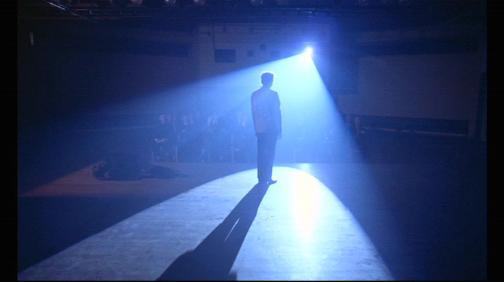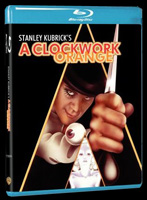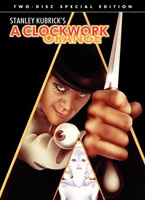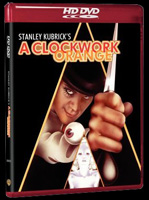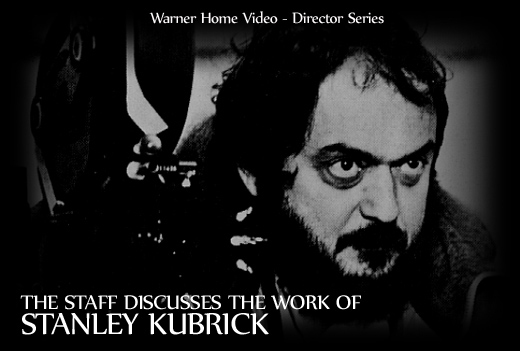
Day One – The Shining / Day Two – Full Metal Jacket / Day Three – Eyes Wide Shut
Day Four – A Clockwork Orange / Day Five – 2001: A Space Odyssey Mesage Board Discussion
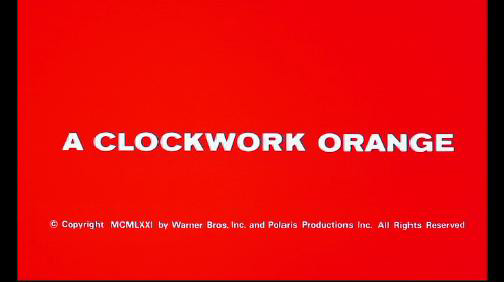
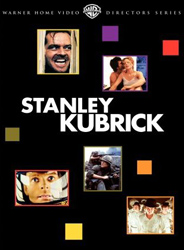 BUY IT AT AMAZON: CLICK HERE
BUY IT AT AMAZON: CLICK HERE
STUDIO: Warner Bros.
MSRP: $79.98
RATED: Unrated
RUNNING TIME: 137 Minutes
SPECIAL FEATURES:
- Theatrical trailer
- Commentary by Malcolm McDowell and Historian Nick Redman
- Great Bolshy Yarblockos!: Making A Clockwork Orange
- O Lucky Malcolm!
The Pitch
One crazy son of a bitch film, Stanley Kubrick’s adaptation of Anthony Burgess’s acclaimed novel of misspent youth, slang, and a little of the ol’ Ultraviolence. Banned in the UK for many years, oft-quoted by fans, and the thing that made Malcolm McDowell a somewhat household name. You’re welcome!
The Humans
Director: Stanley Kubrick
Cast: Malcolm McDowell, Warren Clarke, Clive Francis, James Marcus, Sheila Raynor, Philip Stone, Michael Tarn, Patrick Magee, Michael Bates
Writers: Stanley Kubrick
The Nutshell
Alex DeLarge and his Droogs are on the nightly warpath, raping and hurting and drinking milk from a statue’s tit and loving every minute of it. Until Alex is left for the authorities to "rehabilitate". It doesn’t help him all that much, especially when his former associates still enjoy their debauchery and hold a grudge.
The CHUD.com Staff Ruminates on A Clockwork Orange:
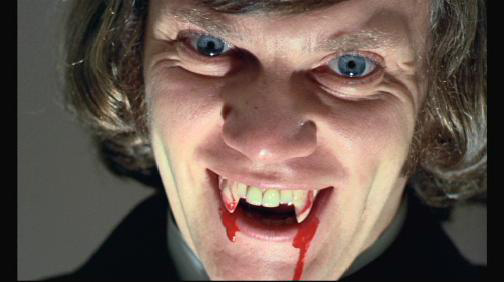
I
don’t remember if I saw Stanley Kubrick’s film of A Clockwork Orange first or
read Anthony Burgess’ version first (I do know the edition I read had Alex
pictured on the cover as a motorcycle hood straight out of the early 60s). What
I am sure of is that my first exposure to that story came in a weird hybrid of
the two, a book containing the script to the movie with a ton of photos, almost
one for every shot.
This book was one of the many things my father left behind when he and my
mother split up. The closets in our apartment were stuffed with boxes of books
and records, and I would spend days going through them, exploring the pages and
the vinyl in a haphazard way. If my dad had been around I might have discovered
these things in a more linear fashion, but left to my own devices I read Venus
on the Half Shell, a book supposedly written by Kilgore Trout, before I ever
read anything by Kurt Vonnegut (Venus on the Half Shell had a better cover. It
had a naked lady on it).
I didn’t see A Clockwork Orange until some time in the mid to late 80s, after
Video Van had opened on Main Street in Kew Gardens, Queens. This was a store
that would deliver your VHS rentals to you, sort of a proto-Netflix. My friend
Joel Israel and I would use his father’s membership to raid the store for gore
films and exploitation films and all sorts of movies that we were certainly too
young to see. A Clockwork Orange was one of the early ones, and I distinctly
remember watching the movie for the first time and being able to quote it
because I had read that photo book so often.
There’s something about that photo book, and that movie, that sums up my own
interest in film to this day. I was taken by the language in the photo book, by
the brutality of the story and by the meaning behind Alex DeLarge’s ordeal with
the Ludovico Technique. Even as a pre-teen the thematic elements of freedom vs
control rung true with me. But the book also served as a glorious masturbatory
tool – it was filled with pictures of naked women. They were tiny black and
white pictures, but this was an era before internet porn, when masturbating to
fully clothed women on network television was the norm. I could have this book
in my room and my mother wouldn’t know what the heck it was, or for what
dastardly purpose I was using it. And when I was done doing my dirty business I
could read the book and get something more out of it. I still think that’s a
good way to judge art, whether it be movies or music or novels – does it have
something for both your heads?
– Devin Faraci
What’s more moral? A man who is free, vibrant and thinks only of
himself, commits horribly violent acts including theft, rape, murder?
Or a society that forces a man to behave, enforces morality into his
mind against his will and then uses him as a political pawn? I feel
like A Clockwork Orange is a gateway film for a lot of young people
into the world of Stanley Kubrick, but I’m afraid that often what
attracts them is the “cool stuff,” by which I mean the incredibly
eye-popping visuals, costumes, violence and absurdity (including the
fantastically fun Nadsat dialogue, lifted faithfully from Anthony
Burgess’ novel). I find this unfortunate, for as sure as A Clockwork
Orange is a controversial film, an eye-catching film, a violent film;
it’s also an incredibly thoughtful one.
A Clockwork Orange becomes more relevant every year. Whenever we hear
about someone going on a mass killing spree or doing something truly
appalling, we ask ourselves how it could happen. Why don’t they think
of other people? Why are they thinking solely of themselves? Kubrick’s
answer is that they were raised that way. His young Alex is a product
of his society, a vibrant slice of life (or, orange) going through the
motions (like clockwork, see?). Alex is evil, but are his acts of crime
any worse then the torturous prison treatment he receives? Or the
punishing greeting he gets from his former gang members when he’s
released from prison? Or his family’s willingness to quickly move on
without him? Or a murder attempt from an old man, effected by Alex’s
former crimes, driven to vengeance and attempting to use Alex in a
political move? Or the government, willing to give Alex a job to use
him as an example of rehabilitation? There are no easy answers in A
Clockwork Orange, but the questions it raises can leave you thinking
for days.
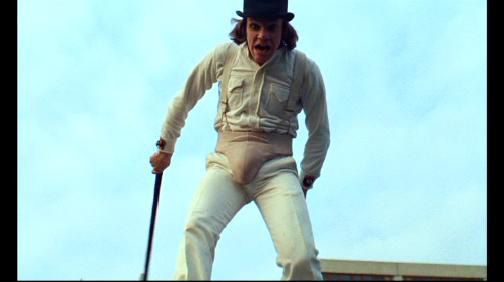
"A
Clockwork Orange is my current favorite.
I was very predisposed against the film.
After seeing it, I realized it is the only movie about what the modern
world really means." – Luis Bunuel.
If Bunuel is
correct, then this might be the most succinct explanation for why I cannot take
A Clockwork Orange as anything more than an exercise in peerless
craftsmanship. This is not to suggest
that Kubrick’s goal was to merely show off; it’s just that the unremitting
nihilism investigated and dramatized is too off-putting to enjoy on almost
every level.
But try not
to get sucked in once you hear Wendy/Walter Carlos’s and Rachel Elkind’s
synthesized rendition of Henry Purcell’s "Music for the Funeral of Queen
Mary".
Kubrick once
said that Anthony Burgess’s book "was the kind of book that you have to
look hard to find a reason not to do."
That reason was the filmmaker’s inability to get his intensely
researched Napoleon biopic off the ground.
After that film’s first development period, Kubrick set it aside an took
on A Clockwork Orange, which offered him a shorter, more manageable text to
adapt to film. The main thematic
challenge for Kubrick was depicting the violence of Alex and his Droogs in a hyper-stylized
manner that would be true to Burgess’s novel.
So he set about cramming in more brilliantly selected classical music
cues to underscore the malevolence of his protagonist – which makes these
actions more repugnantly beautiful.
A Clockwork
Orange was a comparably quick production for Kubrick, and, because of this,
I’ve often entertained the notion that he didn’t fully conquer the
material. But this is balderdash. Kubrick knew all. And if this is what the
modern world really means, he knew more than many of us would probably like to
know.
There was me, that is Alex …
A Clockwork Orange was a film made before its time.
Stanley Kubrick did things with this movie that could only be described
by me as brilliance misunderstood. Kubrick actually pulled the movie
from shelves in Europe and it remained unavailable there until after
his death. The reason was because people convinced him that he could be
the target of the type of people that he presented in this movie. The
only thing that tells me is there are a lot of stupid people in the
world.
A Clockwork Orange owes much of its brilliance to a
mixture of the direction of Kubrick, the framing of the scenes by
cinematographer John Alcott and the editing by Bill Butler. Alcott
worked on 2001, but Clockwork was his first attempt as lead
cinematographer. He would impress Kubrick so much that he would go on
to shoot both Barry Lyndon and The Shining as well, and he deserved. On
the other hand, Clockwork was Butler’s only theatrical movie to work
with Kubrick, but in that one collaboration, he would achieve his only
Oscar nomination. Kubrick himself received two nominations for his work
on the film, best writing and best directing, and the movie itself
would be nominated for an Oscar for best picture. So, why would such a
critically successful movie be yanked from the shelves in Europe? It
was misunderstood.
The gang violence the movie shows is quite tame compared to what we are
used to today, but was handled better than any of the torture porn that
is so popular in culture at this time. A great example is the actual
gang fight in the empty warehouse. Shot from a distance, with only
minimal close-ups, it is not so much a fight scene as it is a dance.
The fighters leap and somersault around the room, an acrobatic display,
edited to the music of Gioacchino Rossini’s The Thieving Magpie.
It is almost a theatrical performance that should be seen as a
beautifully choreographed display than a brutal fight scene. I have
seen much more brutal violence in the movies of John Ford.
There was also the accusations of violence against women, based on two
scenes, one in which the gang rapes a woman while forcing her husband
to watch and the second where Alex kills the Cat Woman with a giant
phallic statue. The rape scene was shown with close-ups to the victim’s
faces and a wide shot of the boys while, once again, dancing around the
room. This scene is quite possibly the most disturbing one in the
entire movie based on a simple improvisation by Malcolm McDowell.
Kubrick was not happy with the scene as it was playing out and felt it
needed something, so he asked McDowell is he could dance around while
abusing the woman. McDowell began to dance and then started to hum and
then began to sing Singing in the Rain.
The contrasting between the violence and the happy song was enough to
being the scene to a level that it never could have reached as written.
The discomfort is simply the lead up to the violent rape, which is
never shown. With the contrasting styles, many people I have spoken to
believe the rape actually occurred on screen in one way or another.
That is the brilliance of Kubrick.
The movie ends with the retribution against the violent Alex, and then
suddenly it is turned on its head as Alex becomes the victim. It is a
case where all the violence and damage that Alex does is brought back
on him 100 percent. No bad deed goes unpunished and in the case of the
government, no good deed goes unpunished either. The movie is both a
visual masterpiece and a well scripted one as well. Everyone who is
hurt gains revenge against Alex, and then once that happens, Alex
becomes the victim. It is a very unique story told with a visual flair
that twists the story to places that were never expected. It holds up
as one of the great, misunderstood classics in cinema history.
The fucked-up thing about A Clockwork Orange is how much fun it is. This, along with Dr. Strangelove, is Stanley Kubrick’s most sheerly enjoyable movie. To quote Jack Black from High Fidelity,
“It’s so funny and violent…and the soundtrack kicks fucking ass.” It’s
the kind of movie that when you think of, you think of the individual,
bravura scenes that constitute it. The opening scene. Sex scored to
“The William Tell Overture.” Alex turning on his droogs. Their revenge.
Alex’s “love” for The Bible. The fight against the rival droog gang.
The murder of the cat lady. Alex’s “rehabilitation.” And, of course,
“Singin’ in the Rain.” I’ve always thought that this flick had to have
been for 1971 what Fight Club was for 1999—no one had ever seen anything like it, and you just felt shaken and excited afterwards.
And that’s what makes it fucked up! You watch this flick, laughing and
cheering and receiving great pleasure from Alex’s horrible actions!
Part of that is Malcolm McDowell’s fault. Alex DeLarge is his best
performance, and his glee becomes our glee. And that’s what, I think,
troubled Kubrick so much about his own film. After it inspired so many
real-life violent attacks, he realized that his argument was too
persuasive. He wanted to make us complicit in the violence by means of
shaming us, and instead, he got many of us to join the madness it
seemed like he was condoning. I’m not surprised he (successfully) got
his own film banned in the U.K. for twenty-five years to avoid further
incidents, but at the same time, I’d not give up my initial viewing of
it (and the many more since then) for anything in the world.
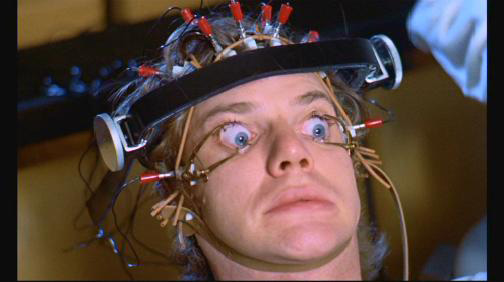
What a wild ride this movie turned out to be. Set in the future that,
if it came true, was nothing I wanted a part of so in essence this
movie scared me. At first I thought Alex (Malcolm McDowell) should have
been hung and it was not until I watched this movie a couple of more
times that I grew to appreciate what Kubrick was doing. Alex was just a
by product of his surroundings and those in control capitalized on this
moment and turned Alex into a guinea pig. Little did they know that
Alex’s controlled reactions would wear off like a drug and in the end
Alex was still the same.
Another thing about this movie I love is Alex’s dialogue. "Naughty,
naughty, naughty! You filthy old soomka!", "O my brothers, I got a lot
better munching away at eggiwegs, and lomticks of toast and lovely
steakiwegs". I always wanted to see a sequel to this movie just to see
where Kubrick would take an older Alex.
– Eileen Bolender
stylized dystopian future. A gang of four drink narcotic laced milk at
a local bar, while waiting for the bloodlust to kick in for a night of
ultraviolence. The face of the urban punk had been seen by Kubrick and
it wore a bowler. I was introduced to A Clockwork Orange, while
visiting a college film class during one of my many college visits
during those years when I was trying to decide on a secondary education
habitat.
Watching a professor break apart every inch of “The Thieving Magpie”
gang fight to point every little detail was an exercise in the exciting
tedium of appreciating film. What still kills me about this approach is
how it works for a Kubrick film. From the SS hat on the rival gang
member’s head to the perfect proscenium positioning of the fight shows
an attention to detail that is found in film anymore. Kubrick invites
us all into the sheer desire and design to invite the audience into the
ultraviolence, while giving us a calm narrator to make us imbibe the
carnage. In a lesser age, the man would’ve been called a pornographer.
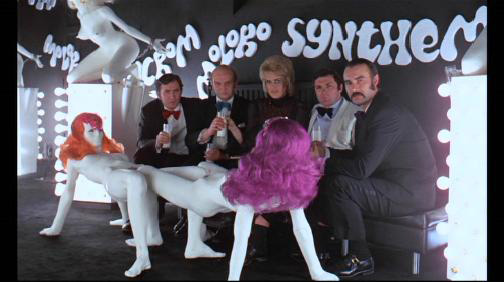
Where Mom expanded my cinematic horizons by doing her homework, Dad
acheived similar ends by going lighter on the research than was
probably wise. Generic-sounding titles such as Battle Beyond the Stars (bless you, Sybil Danning) and Fantastic Planet (bare-breasted blue alien, I’ll get back to you) frequently slipped past the paternal radar. I’m still not sure how the big O
got past him– after all, he’d been burned by Anthony Burgess before
(bless you, Rae Dawn Chong)– but when my weird grade-school buddy Paul
talked up Alex’s adventures in In-Out Land and we found out it was
playing the UC Theatre for one day only, there was only one man to turn
to. My chief memory is that the house was packed and we were seated
behind a row of Droogs. And that after the movie I felt like hitting
things. I was cured, alright. Bless you, Dad.
Until
I saw A Clockwork Orange, I had no idea what audience complicity was.
The idea that I might be intimately tied to the actions of an onscreen
character had never occurred to me. Like most people who go to movies just to
see neat stuff on the screen, I had certainly fantasized about being characters
in film, but before this I don’t recall having been actively accused of being
like the people I was watching. Kubrick’s use of point of view, putting the
audience in Alex’s shoes, and the association between Alex’s conditioning and
the conditioning he imposes upon Mr. Alexander, the writer, drove the point
home clean and clear.
It’s
probably better to have that idea handed to a (relative) child, seeing the film
at 17 or so, rather than having it forced upon an adult that feels comfortable
with film as entertainment. It’s not as shocking by any stretch, but probably
more fundamentally effective. Like that old story about everyone who saw the
Bad Brains going on to start their own band, I could conceive of everyone who
saw this film at a certain age going on to be a filmmaker or critic.
So
in that respect I’m more jealous of Clockwork‘s contemporary audiences
than those that saw his other films upon release. The counter-cultural event of
2001
would have been beautiful, especially the delight of seeing the film in 70mm,
but having the raw shock of A Clockwork Orange‘s brutality in
the first weeks of release would have been comparable to only a few filmgoing
experiences — maybe seeing The Wild Bunch or Straw
Dogs upon release might have come close. (Theoretically, it’s possible
to have caught a Straw Dogs / Clockwork double feature, since they
were released within weeks of one another.)
Like
those two Peckinpah films, Kubrick’s feature hasn’t lost any teeth. That the
violence is more theatrical than current standards allow means nothing; the
broad framing, artful staging and countercurrent musical choices all remain
potent. The work may even be more effective now because the media and standards
it spawned are so much a part of our viewing habits. Factor in the truth of
some of Burgess’ and Kubrick’s predictions about the violent spiral of society
and our deeper familiarity with highly subjective and pseudo-POV cinema, and
it’s easier to step into the shoes of Malcolm McDowell’s sociopathic Alex. I’m
looking forward more to Michael Haneke’s Funny Games remake more than almost
anything else remaining in 2007, but that, and most of Haneke’s catalog,
wouldn’t be possible without the frightening perceptions Kubrick splashed on
the screen in 1971 along with blood and Beethoven.
I’ve seen A Clockwork Orange probably five times in my life and despite my best efforts I never get around to liking it. I appreciate it. I respect it. I get its importance in the grand scheme of things, especially as it’s influenced so many things I love [which makes me sort of an idiot], but a combination of the style, tone, and omnipresence of Malcolm McDowell [though I do worship him in Time After Time] completely kills it for me. Which is sort of the point, isn’t it?
Growing up I had a bunch of friends who worshipped the film [including sometime CHUD.com contributor Sean Fahey], and the presence of the film and some of its dialogue became too much a part of the vernacular, each utterance a knife. In essence, the brilliance of the film was used as a weapon against me, which ruined it. Even watching it now for this review I find myself seeing all the stuff I should love just bothering me, though the main revelation I get from it is that Ewan McGregor must have watched this film a million times because Malcolm McDowell/Alex DeLarge… is very much akin to the beloved Trainspotting alum.
This is the one Kubrick film that just isn’t for me. At all.
I love A Clockwork Orange. There’s no doubt about it. Still, as
I write this, I’m having a lot of trouble trying to summarize my
thoughts on the movie. And after some consideration, I think I’ve
finally figured out why: The truth of the matter is, I don’t really
want to examine the reasons why I love A Clockwork Orange so much. In
fact, I think I’m actually afraid to analyze it too deeply. Because I
think if I did, I’d be revealing more about myself than I’d be
revealing about the film. Sure, I could talk about the movie’s
anti-violence message and its exploration of the relationship between
morality and free will. That’s all well and good, but I don’t think
those things are what make A Clockwork Orange so appealing to
me. If I’m really honest with myself, I’d have to say that I love the
film because of the violence, not in spite of it. Here’s a movie about
a violent psychopath, a sadistic rapist and eventually murderer, just
about one of the most evil men ever to appear on film. And here I am,
rooting for him all the way. What kind of a person does that make me?
Probably not much different than everyone else, I suppose. Obviously
it’s Stanley Kubrick’s strategy to draw the audience in and convince
them to identify with Alex despite his crimes. Yes the movie glorifies
violence, but it has to in order to get us on Alex’s side. That way, we
in the audience are implicated in these horrible acts just as much as
Alex, and when he’s judged for his actions, we’re being judged by proxy
for reveling in them. It’s one thing to get an audience to examine the
morals of a fictional character, but it’s another thing entirely to get
an audience to examine their own morality. I think that’s why A Clockwork Orange
works so well, and probably why so many people objected to the film’s
content when it was released. People weren’t so much disturbed by the
violence as much as they were disturbed by their own reaction to it.
It’s not a pleasant notion that any violent act, no matter how
disturbing, can be made to look exciting and fun.
So in the end, either I’m a horrible person getting a sick vicarious
thrill by watching a madman terrorize innocent victims, or Stanley
Kubrick is that good of a director that he can generate sympathy for
even the most contemptible of people. I’ll choose to believe the
latter. Not only because it’s probably true, but also because it makes
me feel a whole lot better.
The Package
Despite my mentioning that I’m not a fan of the flick, I love reading about it and hearing all the opinions of it and though the DVD is loaded wholly with positive responses and opinions about the film (even to some extent from British censors of the time) is quite enriching as to both the film and Kubrick’s long shadow over his peers. A wide array of folks speak about the film and its legacy and the overall impact is rather short but quite good. There’s also a nice little featurette about the making of the film.
That said, the DVD is a celebration of Malcolm McDowell.
He’s featured on an excellent commentary track and in the wake of Kubrick’s depature from Earth he’s become the film’s true ambassador, and he rocks the job like a champion.
There’s also a feature length documentary about the career of Malcolm McDowell. That’s a long time. That said, it’s fun and quite a good show, especially the stuff about Time After Time and Evilenko. Color me surprised. For a non-fan of the actor I now know everything there is to no about him.
Now enjoy some nudity. The best thing in town (NSFW).
8.0 out of 10
